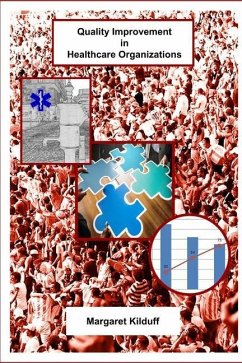Healthcare organization quality improvement (e.g., improvement in the quality of organizational functioning, improvement in the quality of health care delivery) requires an understanding of healthcare organization and delivery processes as well as ways to measure those processes. It requires understanding of statistical analyses which use those measures to decide if there has been quality improvement in those processes. It may seem cut-and-dry, but the history of the healthcare quality movement is full of drama. For example, Ignaz Semmelweis proposed in 1847 that doctors should wash their hands with chlorinated lime solution to prevent the spread of disease and improve both health care and healthcare organization quality. His idea was rejected - continuously and soundly - and it is thought that this rejection led to his nervous breakdown and death in 1865. About the same time (1854), John Snow (this is NOT the John Snow from the Game of Thrones) tried to improve the health quality of people drinking water from the London Broad Street Pump. His measurements and analysis led him to believe that water from the Broad Street Pump was the source of cholera in the area. People would not listen so he removed the handle of the Broad Street Pump so it could not be used. Being unable to convince the public and the government of the validity of his quality improvement analysis, he stopped the cholera outbreak with a wrench.Ernest Codman, MD pioneered the use of quality standards for hospitals and doctors. Dr. Codman was a founding member of the American College of Surgeons (ACS) in 1912 and was instrumental in the formation of its Hospital Standardization program in 1917. However, not everyone was happy with these efforts. In fact, his insistence that the quality (competence) and outcomes of his surgical colleagues at Massachusetts General Hospital (MGH) be evaluated got him fired from MGH in 1914. Florence Nightingale was a nurse in the Crimean War (1853 - 1856). While there she collected data on the deaths of soldiers for the purpose of analyzing the data to improve the quality of military hospitals to reduce soldier mortality. She organized that data into polar area diagrams (which she invented) to demonstrate that disease, especially disease from unsanitary conditions, was the primary cause of soldier deaths. Polar area diagrams are sometimes called coxcombs. As a result of this and other statistical work, Florence Nightingale was made a member of the International Statistical Institute (ISI), a Fellow of the Royal Statistical Society and an honorary member of the American Statistical Association.Perhaps you have thought about healthcare quality and ways it could be improved just as Ignaz Semmelweis, John Snow, Ernest Codman, and Florence Nightingale did. You may have asked yourself if there is a way for you to determine the relative quality of your healthcare choices? Have you found yourself thinking that there should be a way for you to provide your view and input on the quality of healthcare organization? Or do you work in a healthcare organization and find yourself thinking that there must be better ways to continuously and systematically improve the quality of your healthcare organization? If you have, this book is for you.This book is an overview of quality and quality improvement programs, measures, and data in healthcare organizations. These topics are addressed from an evidence-based perspective. The evidence-based approach relies on data which are scientifically collected and analyzed using statistical techniques coupled with literature reviews. It is the foundational approach in modern health care quality improvement systems. This book is for those with a developing interest in the organizational operations, administration, and quality improvement in healthcare organizations and for those who have some expertise, but who wish an overview or refresher of these topics.
Hinweis: Dieser Artikel kann nur an eine deutsche Lieferadresse ausgeliefert werden.
Hinweis: Dieser Artikel kann nur an eine deutsche Lieferadresse ausgeliefert werden.








